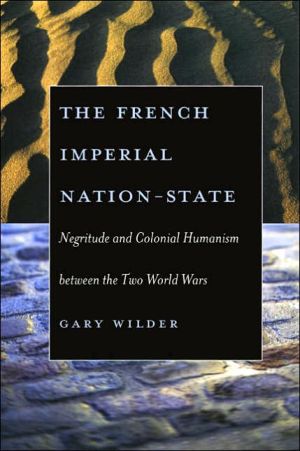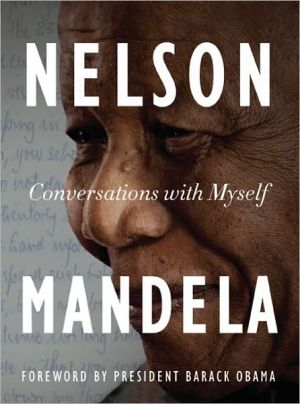The French Imperial Nation-State: Negritude and Colonial Humanism Between the Two World Wars
France experienced a period of crisis following World War I when the relationship between the nation and its colonies became a subject of public debate. The French Imperial Nation-State focuses on two intersecting movements that redefined imperial politics—colonial humanism led by administrative reformers in West Africa and the Paris-based Negritude project, comprising African and Caribbean elites.\ Gary Wilder develops a sophisticated account of the contradictory character of colonial...
Search in google:
France experienced a period of crisis following World War I when the relationship between the nation and its colonies became a subject of public debate. The French Imperial Nation-State focuses on two intersecting movements that redefined imperial politics—colonial humanism led by administrative reformers in West Africa and the Paris-based Negritude project, comprising African and Caribbean elites.Gary Wilder develops a sophisticated account of the contradictory character of colonial government and examines the cultural nationalism of Negritude as a multifaceted movement rooted in an alternative black public sphere. He argues that interwar France must be understood as an imperial nation-state—an integrated sociopolitical system that linked a parliamentary republic to an administrative empire. An interdisciplinary study of colonial modernity combining French history, colonial studies, and social theory, The French Imperial Nation-State will compel readers to revise conventional assumptions about the distinctions between republicanism and racism, metropolitan and colonial societies, and national and transnational processes. Journal of Colonialsm and Colonial History "Wilder has fashioned an argument that ''empricist historians'' will not find easy to dismantle, and this complex book deserves their engagement."-Owen White, Journal of Colonialsm and Colonial History— Owen White
\ The French Imperial Nation-State\ NEGRITUDE & COLONIAL HUMANISM BETWEEN THE TWO WORLD WARS \ \ By Gary Wilder THE UNIVERSITY OF CHICAGO PRESS \ Copyright © 2005 \ The University of Chicago \ All right reserved.\ \ ISBN: 978-0-226-89772-1 \ \ \ Chapter One Introduction: Working through the Imperial Nation-State \ What are we to make of the fact that republican France was never not an imperial nation-state? It is no secret that successive republics were instituted within the framework of a broader and prior colonial empire. Nevertheless, French historiography is typically guided by a national paradigm for which a correspondence between territory, population, and state is considered normal and the existence of colonies is treated as exceptional. There is a frequent tension between the categories that historians use to analyze either the French nation-state or its overseas colonies and the empirewide economic, social, administrative, and publicity circuits that delimited France as an imperial nation-state.\ The point here is not only that the metropole and its overseas colonies exercised a reciprocal influence upon one another, but that France's parliamentary republic was articulated with its administrative empire to compose an expanded and disjointed political formation that must be analyzed in its own right. Once we refigure the nation-state as imperial, disjunctions within and between French territories, populations, and forms of government may be treated as intrinsic features of the national-republican past rather than as obstacles to national-republican ideals. The focus of historiography then shifts away from apparent contradictions between the promises of republican universalism and colonial or racist practices to the antinomy between universality and particularity that existed within both the metropolitan and colonial poles of the imperial nation-state, and which expressed itself in discourses as well as practices.\ Working through the Imperial Nation-State\ This book explores a period of French history during which metropolitan and overseas publics were remarkably self-conscious about the structural relationship between the continental nation and its overseas colonies. Following World War I, the persistence of the empire served as one of the few sure signs that France itself had survived the war in a recognizable form. Supposedly external and secondary colonial possessions curiously came to signify the durability of the self-contained French nation, especially in the context of disruptive sociopolitical transformations between the wars. Through a new discourse of Greater France, a large sector of public opinion regarded a revitalized empire as the guarantor of international prestige and economic prosperity. Colonies were reconceptualized as integral, if legally ambiguous, parts of the French nation. This emergent national-imperial imaginary consolidated as postwar socioeconomic conditions further integrated metropolitan and colonial societies. Yet the very forces driving imperial interdependence also disrupted many of the empire's underlying precepts.\ Although Greater France was at the apex of its power by World War I, the genesis of a long crisis of colonial authority may be traced back to the interwar decades. This incipient crisis generated public debates-official and nongovernmental, metropolitan and colonial, including citizens and subjects-concerning the relationship between the republic and the empire, the legitimacy of colonial power, and the juridical status of colonized peoples. This book focuses on two intersecting movements to revise the imperial order: one by republican reformers elaborated a new logic of administration in West Africa (colonial humanism), and another by African and Antillean elites in Paris formulated new currents of cultural nationalism. Each developed in relation to France's disjointed imperial character, which they also exemplified.\ Colonial humanism was an extension of metropolitan productivism, statism, and welfarism. Yet the peculiar requirements of colonial politics led administrators in French West Africa to treat local populations as members of distinct sociocultural wholes. Policies were therefore shaped by a dual imperative to transform and to preserve indigenous societies simultaneously. The systemic contradiction between requirements to rationalize and differentiate led to paradoxical dictums that guided French colonial projects: socioeconomic individualism without juridico-political individuality, social development without civil society, citizenship without culture, nationality without citizenship. A new colonial rationality placed subject peoples in a politically effective double-bind that racialized them as minor members of the French nation. But it was also self-undermining and created possibilities for critical political interventions.\ Concurrently, expatriate Africans and Antilleans participated in metropolitan French civil society and constituted an alternative black public sphere through which they raised questions about republicanism, nationality, and rights as they intersected with colonialism, culture, and racism. These subject-citizens confronted the emancipatory and oppressive aspects of both the universalizing and particularizing dimensions of French colonial politics. Out of this political field a younger group of student-poets emerged, in the mid-thirties, who would compose the Negritude movement. Their cultural politics challenged the double bind of colonial racism through a series of double gestures. They rejected assimilation while celebrating cultural métissage, claimed political equality while demanding cultural recognition, sought a place within the republican nation as "Negro-Africans" while identifying with a transnational Panafrican community, collaborated with colonial reformers while envisioning an alternative Greater France as a nonracial supranational federation, engaged in rational-critical debate while formulating a critique of colonial rationality itself.\ My starting point is that reformist colonial humanism and black cultural nationalism, as well as their intersections, become intelligible from the perspective of France as an imperial nation-state in crisis. Conversely, these interrelated movements provide a vantage point for grasping France as an imperial nation-state organized around a constitutive contradiction between political universality and particularity.\ This study has an imperial scope. It traces interpersonal, institutional, and discursive networks that included republican policymakers in Africa as well as Africans and Antilleans in the republican metropole. These empirewide circuits delimited a common political field whose members belonged to an imperial cohort that transcended clean distinctions between colonizing French citizens and colonized African subjects. The scale and composition of these networks exemplified one way in which France was an imperial nation-state. Additionally, they generated reflections upon and projects addressing the national-imperial order, an issue then forcing itself into political consciousness, some of which I analyze below.\ This book thus extends recent scholarship on the intersections between French colonial and metropolitan histories. It does so through an inquiry into political form and political rationality that seeks to displace conventional oppositions between the French colonial empire and national republic, racism and universalism, the national and the transnational. The analysis refuses to fetishize one side of these oppositions as a privileged standpoint from which to critique the other. Apparent contradictions between republicanism and colonialism cannot be transposed into a distinction between universalism and particularism. There were universalist and particularist dimensions of republican and colonial poles of the imperial nation-state, each of which contained emancipatory and oppressive dimensions. We cannot adequately understand the national-imperial order if racism and colonialism are treated as signs of the absence or failure of republicanism understood one-sidedly as universalism. Such a gesture, still common in French colonial historiography, effectively protects an idealized republicanism by pointing to its supposed violation rather than exploring its actual operation.\ French colonialism provides a fruitful occasion to raise questions about the limits of a national history paradigm that often affirms republicanism's universalist self-understanding. There is a risk, however, that by simply applying this paradigm on a broader scale, French historians of colonialism will reenact that which they are supposed to explore: the incorporation of overseas territories into a republican national metanarrative. This tendency appears throughout Alice Conklin's A Mission to Civilize, a monograph that merits attention here not because it represents a varied body of historiography but because it is so readily cited in writing about Third Republic colonialism.\ Conklin studies the way in which the oppressive policies of the French civilizing mission in West Africa were informed by supposedly emancipatory universalist republican values to which colonial administrators were genuinely committed. This promising starting point might have led to an examination of internal links between republicanism and colonialism. But Conklin's ability to present an integrated account is undermined by the methodological individualism that guides her analysis. She focuses on the motivations of individual policymakers in order to determine whether their intentions were disinterested (genuine) or self-interested (in the service of political objectives). She then compares administrators' sincere attempts to help Africans through projects influenced by republican principles to the way in which such efforts were undermined by self-serving political interests. Because she does not explore how government in West Africa was sincerely republican and genuinely colonial, France's oppressive practices there appear to be anomalous (e.g., ironic or cynical failures). Such an evaluation is only possible because Conklin conflates republicanism with universalism, which is assumed to be inherently opposed to colonial racism (reduced to particularism). She does not recognize the ways in which contradictions between universality and particularity were internal to republican, colonial, and racial discourses and practices.\ Instead, Conklin focuses primarily on contradictions between plans and implementation. This analytic leads her to condemn (as tainted) science that serves political interests as well as policies that use science cynically. By criticizing the colonial misuse of ethnography, Conklin implies that disinterested science would objectively inform enlightened policy and reduce oppression. She does not recognize the racializing power of real science. Similarly, by arguing that administrators' sincere attempts to improve African lives were undermined by cynical interests, she preserves the ideal of disinterested improvement projects. She does not explore how welfare policies were real instruments of colonial government. Ultimately, A Mission to Civilize functions to protect the purity of republican universalism, scientific knowledge, and improving gestures from the contaminating influence of racism, self-interest, and instrumental politics. It thereby folds French colonialism into a canonical narrative of republican universalism that remains as undisturbed as the national paradigm that is its starting point.\ Conklin's affirmative historiography compares the West African administration to a mythically self-identical republic that never existed historically. The French nation-state was always a disjointed political form. Its administrative, liberal, and parliamentary dimensions did not always align with one another. Citizenship, nationality, and the people were at once abstractly human (universalist) and concretely cultural (particularist) categories. Imperialism meant that French territories, populations, and governments did not correspond to one another seamlessly. These obscured structural contradictions became increasingly evident under the Third Republic. By the end of World War I a new state-economy-society diagram meant that French government was organized less around liberal individualism than around statist, productivist, and welfarist forms of corporatism. Interwar colonial administration was a variant of postliberal politics, not simply a violation of parliamentary republicanism, which no longer existed. Likewise, metropolitan state politics shared features of colonial administrative rule. Differences between them, such as the racial divide between rulers and ruled, cannot be translated into distinctions between republicanism and racism, liberalism and authoritarianism. Colonial humanism was simultaneously universalizing and particularizing; the imperial nation-state was at once republican and illiberal.\ Like Conklin, colonial reformers and colonized elites also often protected the French national-republican ideal while denouncing its colonial violation without exploring the underlying connections between them that sustained the national-imperial order. Scholars must beware of the tendency to enter into what Dominick LaCapra, adapting Freud, has called a transferential relationship to history, whereby "the considerations at issue in the object of study are always repeated with variations-or find their displaced analogues-in one's account of it." Otherwise, LaCapra explains, they risk acting out rather than working through history. His analysis refers to the ways in which scholars of historical trauma tend to reenact victims' traumatic experience. But scholarship on historical perpetrators also risks reaffirming their self-understanding.\ Instead of acting out republican colonialism, the following chapters attempt to work through the imperial nation-state. Acting out would incorporate colonial societies into an expansionist national historiography that conflates republicanism and universalism. Alternatively, working through entails situating (not mastering or resolving) the sociopolitical dilemmas raised by French colonialism in relation to the nation-state as an imperial political form. An adequate history of imperialism must take the empire itself as its object and starting point. Rather than study how French republicanism might have been played out in the colonies or how colonialism might have affected national identity, it would question received understandings of the national republic as a self-contained entity that can be considered apart from the imperial nation.\ Although interwar reformers and nationalists frequently enacted aspects of republican colonialism, they were not condemned endlessly to act out its dilemmas. They also explored the imperial implications of French national history as well as the national implications of French imperial history, recognizing the imperial nation-state as an inescapable reality through which they had to work. Because it was an intrinsically contradictory form whose crises opened possibilities for systemic transformation, immanent critique-identifying within it alternatives that pointed beyond it-was a quintessential type of working through. Insofar as these historical actors self-consciously engaged the national-imperial order that confronted them, historians interested in "working through" it should follow their lead.\ An approach to working through that avoids the binary reasoning criticized above would treat the imperial nation-state as an artifact of colonial modernity. This broad term refers variously to the impact of colonial capitalism on local societies and its articulation with other modes of production, colonized peoples' novel and often subversive appropriation of Western institutions, and the constitutive role of colonialism, non-Western populations, and their encounter in the making of modern Europe. A common thread links these meanings: imperialism created novel sociopolitical formations that were irreducibly different from those in the West yet were incontestably modern and inseparable from their European counterparts.\ Many recognizable aspects of modernity were notably absent from or prohibited in most colonial societies; examples include free labor, private property, abstract individuality, impersonal common law, disenchanted civil society, and representative government. Yet the often extreme economic exploitation, social violence, racial hierarchies, and authoritarian politics endemic to colonialism were neither pre-colonial survivals nor symptoms of European regression. They were effects of modern capitalism, rational bureaucracy, scientific administration, normalizing state practices, technological development, urbanization, and the like. This seemingly simple point may nevertheless generate complex analyses when it guides historical inquiry into the peculiar modernity embodied by and generated through colonialism. Such an optic does not only allow us to specify the internal dynamics of colonial societies more precisely. It also enables a multifaceted and global (in both senses of the term) view of modernity, not as one composed of plural alternative modernities but as a worldwide if heterogeneous dynamic that works through and on Western societies but is neither possessed nor controlled by them.\ (Continues...)\ \ \ \ \ Excerpted from The French Imperial Nation-State by Gary Wilder Copyright © 2005 by The University of Chicago. Excerpted by permission.\ All rights reserved. No part of this excerpt may be reproduced or reprinted without permission in writing from the publisher.\ Excerpts are provided by Dial-A-Book Inc. solely for the personal use of visitors to this web site.\
Pt. 1The imperial nation-state1Introduction : working through the imperial nation-state32Framing greater France : a real abstraction24Pt. 2Colonial humanism3Toward a new colonial rationality : welfare, science, administration434A doubled and contradictory from of government765Temporality, nationality, citizenship118Pt. 3African humanism6Negritude I : practicing citizenship in imperial Paris1497Negritude II : cultural nationalism2018Negritude III : critique of (colonial) reason256Conclusion : legacies of the imperial nation-state295
\ French Review"Wilder''s careful and thorough analysis of the long-term development of the French welfare state as well as its subsidiary colonial administration . . . is a must-read. . . . A boon for anyone whose knowledge of France and its colonies comes laargely from film and literature that were generated by the colonized."\ — Jacqueline Thomas\ \ \ \ \ \ American Historical Review"Wilder''s trenchant and insightful book will be of considerable interest to scholars of French and African history, particularly in the subfields of intellectual, cultural, and political history."\ — Elizabeth Schmidt\ \ \ \ New West Indian Guide"This remarkably original and groundbreaking study renews and enriches our understanding of the interwar Negritude movement and its historical context. The volume''s wide-ranging interdisciplinary scope combines archival research, critical theory, and literary analysis to powerful effect. Gary Wilder surpasses all previous studies of Negritude in his scrupulous and theoretically resonant inquiry."-Nick Nesbitt, New West Indian Guide\ — Nick Nesbitt\ \ \ \ \ \ Itinerario"Wilder focuses on broad themes rather than furnishing a detailed case study, but his method of analysis will be of practical benefit to historians exploring interactions within the imperial nation-state, and will be excellent for use in graduate seminars on imperialism and French colonialism."\ — Jeremy McMaster Rich\ \ \ \ \ \ Journal of Colonialsm and Colonial History"Wilder has fashioned an argument that ''empricist historians'' will not find easy to dismantle, and this complex book deserves their engagement."-Owen White, Journal of Colonialsm and Colonial History\ — Owen White\ \ \ \ \ \ American Historical ReviewWilder's trenchant and insightful book will be of considerable interest to scholars of French and African history, particularly in the subfields of intellectual, cultural, and political history.\ — Elizabeth Schmidt\ \ \ \ \ \ ItinerarioWilder focuses on broad themes rather than furnishing a detailed case study, but his method of analysis will be of practical benefit to historians exploring interactions within the imperial nation-state, and will be excellent for use in graduate seminars on imperialism and French colonialism.\ — Jeremy McMaster Rich\ \ \ \ \ \ Journal of Colonialsm and Colonial HistoryWilder has fashioned an argument that 'empiricist historians' will not find easy to dismantle, and this complex book deserves their engagement.\ — Owen White\ \ \ \ \ \ New West Indian GuideThis remarkably original and groundbreaking study renews and enriches our understanding of the interwar Negritude movement and its historical context. The volume's wide-ranging interdisciplinary scope combines archival research, critical theory, and literary analysis to powerful effect. Gary Wilder surpasses all previous studies of Negritude in his scrupulous and theoretically resonant inquiry.\ — Nick Nesbitt\ \ \ \ \ \ Laurent Dubois“In this strikingly original work, Gary Wilder combines archival research, political theory, and literary analysis to issue a decisive challenge to reigning approaches to the study of French history. The result is a book remarkable both for its far-reaching theoretical implications in colonial studies and for the humane way it illuminates the dilemmas and engagements of a fascinating generation of thinkers.”--Laurent Dubois, Michigan State University\ \ \ \ \ \ Antoinette Burton“Wilder accomplishes what is rare enough in the new imperial history: he deftly illustrates both the constitutive impact of colonial modernity on metropolitan forms and the centrality of people of African descent to the story of European political and cultural development. His emphasis on the disjointed character of the imperial nation-state is as provocative as it is original, making this book a must-read for students of national, colonial, and postcolonial histories."--Antoinette Burton, University of Illinois at Urbana-Champaign\ \ \ \ \ \ \ Tyler Stovall“An exemplary piece of scholarship. Starting from an interest in French colonial history, Wilder seeks to reframe the way we think about the history of modern France as a whole. The author lays out a sophisticated theoretical framework that is both original and well grounded in several intellectual fields.”--Tyler Stovall, University of California, Berkeley\ \ \ \ \ \ \ \ \ John Comaroff“Gary Wilder’s historical anthropology of the French imperial nation-state is the work of a truly gifted scholar. It evinces quite an extraordinary mix of imagination, critical acuity, theoretical subtlety, and empirical depth. It is, in short, a fine history and an exceptional anthropology that is highly relevant to our understanding of both European nation-states and the U.S. imperium at the dawn of the twenty-first century.”--John Comaroff, University of Chicago\ \ \ \ \ \ \ Mamadou Diouf“This highly original book is a major intervention on the scholarship of empire, race, colonialism, nationhood, and modernity. Meticulous in its detail, provocative, and imaginative in its interpretations, it identifies the key issues of administration, government, and citizenship to illuminate the cross-cutting currents that shaped both France and her African colonial empire.”\ \ \ \ \ \ American Historical Review"Wilder's trenchant and insightful book will be of considerable interest to scholars of French and African history, particularly in the subfields of intellectual, cultural, and political history."\ \ \ \ \ \ Itinerario"Wilder focuses on broad themes rather than furnishing a detailed case study, but his method of analysis will be of practical benefit to historians exploring interactions within the imperial nation-state, and will be excellent for use in graduate seminars on imperialism and French colonialism."\ \ \ \ \ \ Journal of Colonialsm and Colonial History"Wilder has fashioned an argument that 'empiricist historians' will not find easy to dismantle, and this complex book deserves their engagement."\ \ \ \ \ \ New West Indian Guide"This remarkably original and groundbreaking study renews and enriches our understanding of the interwar Negritude movement and its historical context. The volume's wide-ranging interdisciplinary scope combines archival research, critical theory, and literary analysis to powerful effect. Gary Wilder surpasses all previous studies of Negritude in his scrupulous and theoretically resonant inquiry."\ \ \








